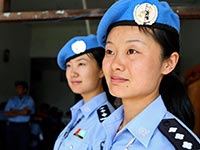UN policing is gaining increasingly importance in United Nations peacekeeping missions, yet the role and function of the police forces is largely unknown. “Blue helmet” is mainly associated with UN soldiers, although the police has been evolving into an independent actor and central part of peacekeeping missions in recent years. These development raises practical and legal challenges.
The research project “UN Policing – Legal Basis, Status and Directives on the Use of Force” pursued three objectives: (1) To identify and critically review the current legal basis of UN policing under public international law, (2) to clarify the status of police officers in pertinent missions, and (3) to critically review rules of engagement on the use of force. The project was carried out under the leadership of Prof. Dr Thilo Marauhn in cooperation with PRIF at the Justus Liebig University Giessen and was funded by the German Foundation for Peace Research.
The international workshop “United Nations Policing – Current legal and practical challenges” takes place from 30th of November to 1st of December 2017 at PRIF and marks the end of the project. During this concluding workshop core questions of the project will be addressed and evaluated again.
Experts from academia and practice (especially UN Police, German Police and politics) will discuss current developments and challenges of UN policing. How has international policing evolved until today? What role do police officers play in peacekeeping missions? Which challenges and developments are to expect for the police component in UN missions in the future? Furthermore, legal aspects will be addressed: What legal concerns arise in context of the use of coercive force in peacekeeping missions? Which role do human rights play? Additionally, the different aspects of accountability in cases of legal violations will be discussed. It has to be explored if legal gaps exist and whether and how these can be filled.
Participation is granted by invitation only. If you are interested, please contact Judith Thorn.
Program:
Thursday, 30th November 2017
12:45 Panel 1: The Development of International Policing
- Judith Thorn, HSFK/ Justus Liebig Universität Giessen
- N.N.
14:30 Panel 2: Hopes and Expectations towards the UN Police
- Philipp Bovensiepen, Chief Superintendent, State Office for Training, Education and Personnel of the North Rhine-Westphalia State Police
- N.N.
16:15 Panel 3: The Use of Force in Peacekeeping Operations
- Dieter Fleck, former Director of International Agreements and Policy of the German Federal Ministry of Defence
- Terry D. Gill, University of Amsterdam and the Netherlands Defence Academy
Friday, 1st December 2017
09:00 Panel 4: Policing and Human Rights
- Ralf Alleweldt, Brandenburg State Police Academy
- Dieter Kugelmann, State Data Protection and Freedom-of-Information Officer (Landesbeauftragter für den Datenschutz und die Informationsfreiheit), Rhineland-Palatinate
10:45 Panel 5: Accountability and Disciplinary Measures
- Françoise Hampson, University of Essex
- Kirsten Schmalenbach, Paris Lodron University of Salzburg
13:15 Panel 6: Looking ahead - the Future of Policing in UN Peacekeeping Operations
- Jeffrey Buenger, United Nations Police Division/Standing Police Capacity, Brindisi
- Thomas Fitschen, Federal Foreign Office, Germany
- Christian Schaller, German Institute for International and Security Affairs
